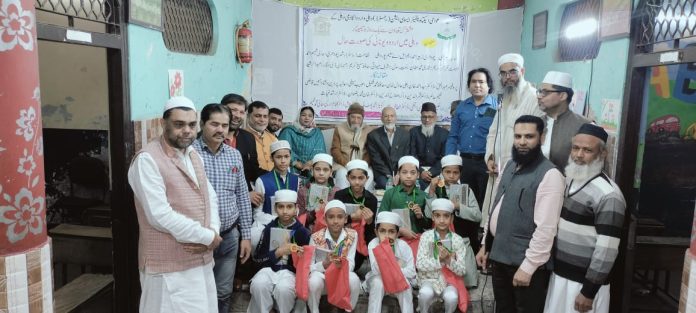New Delhi : A seminar on “The Status of Urdu and Unani Medicine in Delhi” was organized by the Awami Ekta Welfare Association in collaboration with the Urdu Academy, Delhi. Scholars and experts emphasized that the promotion of Unani medicine serves as an effective means of advancing the Urdu language, as its literature and education are deeply rooted in Urdu.
Addressing the event, Professor Abdul Haq stated that despite concerns about the decline of Urdu post-independence, the language continues to thrive. He highlighted that since Unani medicine is taught in Urdu, both are interdependent, and the expansion of Unani medicine has, in turn, strengthened Urdu. He pointed to the increasing number of pharmaceutical institutions and Tibbi colleges as evidence of its growth.
Former MLA Chaudhary Mateen Ahmed, the chief guest, underscored the significance of Urdu as a cultural asset. He urged parents to ensure their children receive an education in Urdu, cautioning that nations that forget their history risk an uncertain future.
Dr. Syed Ahmed Khan, General Secretary of the All India Unani Tibbi Congress, noted that progressive societies maintain a connection with their past while advancing in various fields. He stressed the importance of preserving the legacy of scholars and practitioners, citing eminent figures in Delhi’s Unani tradition, such as Hakim Ajmal Khan, Hakim Mohammad Ilyas Khan Sherwani, and Hakim Abdul Hameed.
Several scholars presented papers at the seminar. Dr. Habib Saifi reiterated the intrinsic link between Unani medicine and Urdu, describing Urdu as a language that fosters unity. Dr. Khan Mohammad Rizwan Khan highlighted the historical relationship between the two, emphasizing the role of madrasas and Unani medicine in their development. Dr. Qamruddin Zakir, President of the All India Unani Tibbi Congress (Haryana State), pointed out that most of the Unani medical literature is in Urdu and preserving this treasure is a collective responsibility.
Mohammad Arshad Chaudhary emphasized that both Unani medicine and Urdu offer promising career opportunities and called for concerted efforts to promote them. Dr. Mohammad Arshad Ghiyas stressed the importance of initiatives for the survival and growth of both Unani medicine and Urdu, recognizing them as integral to cultural heritage. Advocate Shaan Jabeen Qazi highlighted Urdu’s role in fostering social harmony, noting its widespread appeal through poetry and music in India.
Other speakers included Ashraf Mewati, Dr. Altaf Ahmed, Yusuf Malik, Mohammad Irfan, Rizwan Qasmi, Salahuddin, Naeem Alam, Ali Adil Khan, Javed Anwar, Mohammad Sadiq, Haji Mohammad Shamim, Riaz Shamsi, and Mohammad Zubair Sheikh.
The event also saw the release of two books by Dr. Qamruddin Zakir, titled Bazam-e-Insaniyat and Zia-ul-Qamar. Additionally, students of Mahmoodia Public School were honored with awards for their success in competitive exams. The seminar proceedings were efficiently moderated by Hakim Ataur Rahman Ajmali, while Hafiz Shakeel, Manager of Mahmoodia Public School, extended a vote of thanks to all participants.




